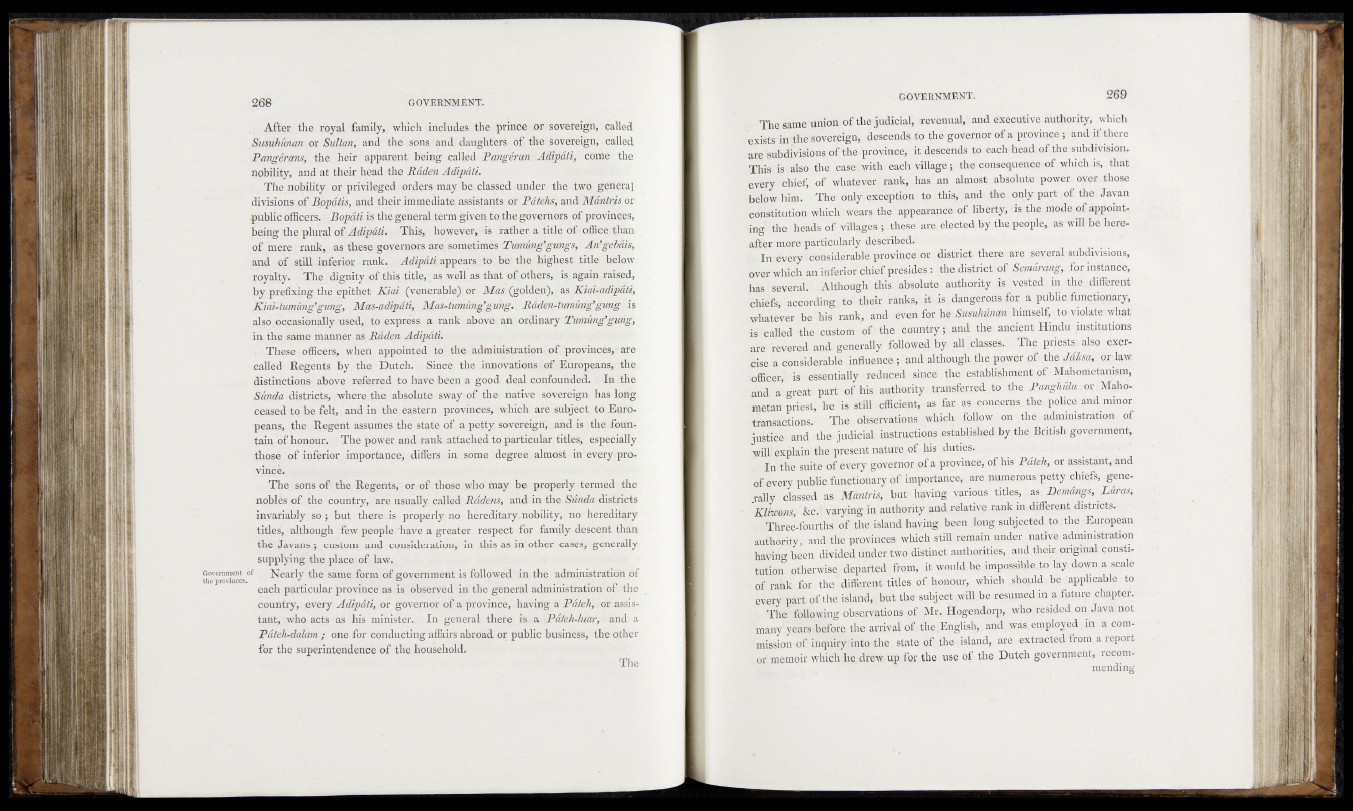
After the royal family, 'which inclydes.jthe-. prince .or sovereign, called
Susuhunan or Sultan, and the\sbns.;and daughters of the! sovereign, called
Pangerans, the, heir, apparent; being nailed, Pangdran Adipati,come the
nobility, and at their head the Raden Adipati.
The nobility or privileged orders may ;be.classed under the two general
divisions of Bopdtis, and their immediate, assistants or Pdtehs, and Mantrjs or
public officers.' Bopati is the general term given.to.the governors of provinces,
being tthe plural of Adipati. • This, : however,, is rather a title of office, than
of mere rank, as these governors are sometimes Tumung’gangs, An’gebais,
and of still-dnferior rank. Adipati appears , to be the highest „titleirbelow
royalty. The dignity of this title, as well,as that of (Others,=ds, again.raised,
by prepsdng the epithet Riai (venerable) or. Mas (golden), as Kiai-adipati,
Kiai-iumfing’gung, Mas-adipdti, Mas-tumdng'gung. ;. Rdden~tumdng-gung is
also occasionally used,’ to express a rank above an ordinary Twmkng’gmg,
in; the same manner as Raden Adipati.
These; officers, when appointed to .the administration of, provincesi* are
called Regents by. the Dutch. Since the innovations.of (Europeans, the
distinctions above referred to have been a good, deal .confounded; In*the
Sdnda districts, where the absolute sway of the native. sovereign has long
ceased to be felt, and in the eastern provinces, which are‘subject.' to- Europeans,
Government <
the provinces*
the Regent assumes the state of a petty sovereign,-,and is {the fountain
of honour. The power and rank attached to particular titles-,. especially
those of inferior importance, differs in some degree almost in .’every province.
>
The sons of the Regents, or of those_wlio may be properly termed the
nobles of the country, 'are usually cdBed Rddens, and in the Sdnda districts
invariably so j but there is properly no hereditarymobility, no hereditary
titles, although few people, “have a greater respect for family- descent than
the Javans| custom and consideration, in this as iff other cases, generally
supplying the place of law.
of -. Nearly the same form of government is followed in, the administration of
each particular province as is observed in the general administration off the
country, every Adipati, or governor of a province, having, a Fateh, or. assistant,
.who acts as his minister. In general. there is, &i Pdfch-luar, j^aa& &
Pdtek-dalam ; one for conducting affairs abroad or public business, the other
for the superintendence of the household.
The
The same union of the-jhdicial, ievenual,' and executive authority, which
exists rin%hefsovereign,-. .descends! i j thé governor of a province; and afcthere
are* subdivisions of the .province,:, it'descends tonachhead-of the subdivision.
This- isalso'*fhè': case .'with • each’ village; thé: cbnsequencK.of j which is, that
every chief, ^ofi wliafev$$ rank, has an almost absolute power over those
ibelow him.' -The' onlyexception-to this, and the ..only part ,of the! Javan
ico'nstitution Which (wears,the appearance of liberty,''is the mode ofappoint-
ing5’the. heads'oft-villages f .these, ar.ef <de.cted;by. the; pehple,n.as'will be hereafter
more-particularly^escribecL i. • v . 5 '
I lmevdryiicbnsicl;erable-.provi'GCfiior. district- there* are several subdivisions,
over which an inferior chief presides: the. district:-of. Sepwrmg,-, ifor instance,
has •’ several. ‘ Although, this-'absolute; authority is : vested, in .the: different
•c h ie fs; according to’«their ranks,.ifois, dangetons for a publia^n^tionary,
.whatever be "his rank,' and pven^onherteMnajzr^m^lfi^^viplate.what
is tcalled (-the custom ó£«thè„ country.; and the .ancient. Hindu institutions
are-reverèd. and generally followed'by.ah.Massës.;, Th&.giiesta. also; exercise
^considerable' influence,; land although-%-power o f,:th e:# ^ ^ i or* law
;officer,: is - essentially - reduced ’ilinenhdhe.'estabHslj^^^fiiMahometanism,
and ar-grea%• part of > his. authority -.transferred to 4 h e , ^ ^ / ^ r -M a h o metan'priest,'
!hesis: still efficient, as fair, as -concerns.|het polke,hnd.minor
transactions. The .observations twhich.L^llWvO^^administration <|f
justice- and .tberjudiciahinstructiqns.eskb^^
Will’explain-the«present naturejof his (duties.^:,* BS. * H r > u:..:|j^ -*
In the suite of .every governorjofa,province, of,his Fateh, .or a.ssistant;iand
ofluèvery public functionary.of: impbtfen.Qe, are,m^erpusjpetty.chi^!^l»e-
j-ally classed as Mantris, but having various^tiiles,,^ as. BemdngsfMrias}
Klrooms, &c.| “varying in authority, and relative rank in^differeat.-4'iatrtós.’'’ -..
( v Three-fourths of theiisland having been, long.^bjectedtd. the European
‘tft&érity, and,the provinces which still remain undey- native^adjuipisferation
having been 'divided under.two distinct a u th o r s ,, and;,the|^ojiginal consti-
tution otherwise departed from, jit^ould,beAmpp.ssibXto lay down a scale
of r a n k e r the'different titles of hpnpiir, vwhich .should, hej^ ^ teab le .to
every part of the Island,Abut the wbjeefiwilhbeke^ppdtff chapter.
*. .The following observations^of,Mr. flogendorp, .wh ^j^d e^o n Jayajpot
manylyearsfoefore the;arrival ofatielEnglisb»1 ,and waSiemgloyednb a.commission
off inquiry1 into the, state Qf.jthd island, are, extracted ffrpm, a report
or memoir which he drew up.for the useof* the Dutch gpverffment, recommencing